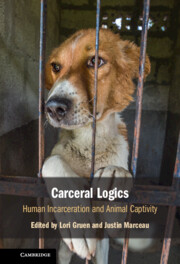Acknowledgments
We began discussing plans for this book at a gathering hosted by the Brooks Institute for Animal Law and Policy in 2019. The Brooks Institute has since provided tremendous support for this project, and we are deeply grateful for their commitment to seeing this collaboration through to publication. With Denver Law School, the Brooks Institute cohosted a workshop on early drafts of many of the chapters presented here. We are grateful for that support and to all the discussants at the workshop: Vikram Amar, Amanda Arrington, Frank Ascione, Marc Bekoff, Jennifer Chacon, Gabrielle Chapman, Alan Chen, Maneesha Deckha, Lora Dunn, Jessica Eisen, Pamela Frasch, Aya Gruber, Sam Kamin, Alec Karakatsanis, Tammy Kuennen, Doug Kysar, Benjamin Levin, Shelby McDonald, Karen M. Morin, Timothy Pachirat, Jessica Pierce, Will Potter, David Rosengard, Laura Rovner, Kelly Struthers Montford, Paula Tarankow, Phillip Tedeschi, and Delci Winders. Not every participant was able to complete a chapter, but we are grateful to all of the persons who have helped with this project, either by writing or providing comments or assistance.
Justin is grateful to all of the students who helped edit, revise, or format these chapters, and in particular Nicole King, who helped plan and coordinate the in-person workshop in 2019. I am also thankful to all of the animal advocates who have had the patience and confidence to hear my critiques of the movement with an open mind. Many of the conversations I have had over the past few years have helped me better understand my own thinking on animals and the law. In particular, I am grateful to Amanda Arrington (Pets for Life at HSUS) whose work with communities to help animals is both unique and visionary. I am grateful to Tim Midura and Kristen Stilt for being friends and allies of the sort who support intellectual inquiries, even if they don’t agree with all of the conclusions or analysis. Both of these individuals have asked me hard questions about this project over the years, which is a real gift. Most importanly, I would be remiss if I did not say that working with Lori has been the realization of a life goal for me. I have long wanted to collaborate with a philosopher, and I can’t imagine one whose work I read (and teach) more regularly, or one who is more incisive and clear in her thinking – I hope we can do it again! Lori is involved in more projects than almost anyone I know, and somehow as generous with her time as any scholar you could meet. And finally, I thank my kids for always asking me hard questions about the intersections of human and animal suffering and for pushing me to imagine a better world for all animals.
Lori would like to thank the students in her “Ethics of Captivity” course at Wesleyan University in the Fall of 2020 for collectively working through issues that are discussed in this volume. I am also deeply indebted to my incarcerated students at both the maximum-security men’s prison – Cheshire Correctional Institution – and the only women’s prison in Connecticut – York Correctional Institution. I am one of the faculty founders of Wesleyan’s Center for Prison Education and have been teaching courses in prison since 2010. What I have learned through my students about the nature of incarceration has deeply informed my thinking about carceral logics. I also want to express my deep respect and appreciation for Justin. He is a brilliant, courageous thinker whom I have learned a great deal from, and he is an absolute delight to work with. I’m so grateful to be able to think and create with him.

